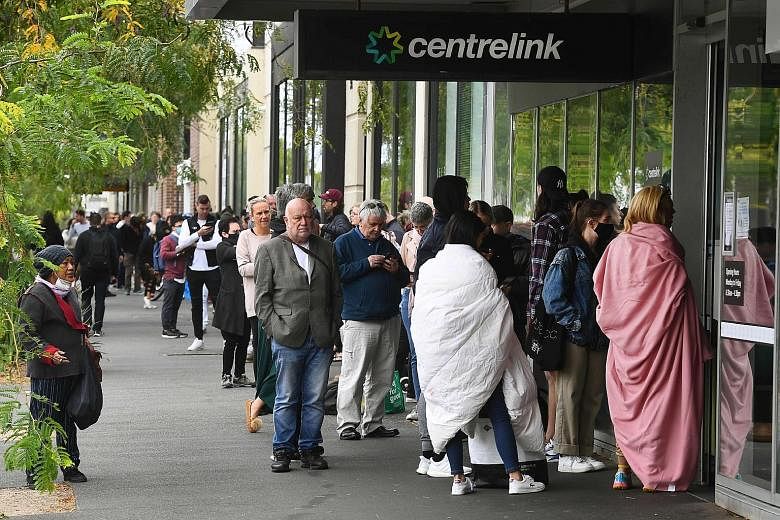SYDNEY • Jobless Australians flooded unemployment offices around the country yesterday as Prime Minister Scott Morrison warned that the coronavirus pandemic would cause an economic crisis akin to the Great Depression.
After a record 29 years of economic growth, Australia is poised to spiral into recession as the pandemic wreaks havoc on the country's economy despite a A$189 billion (S$158 billion) government relief package.
In scenes not seen in Australia for decades, queues stretched around the block at unemployment offices across the country as the forced closure of pubs, casinos, churches and gyms began at midday yesterday.
An online portal for government services crashed as jobseekers rushed to register for income support payments, which have been temporarily doubled by A$550 a fortnight to help people cope with the coronavirus crisis.
With hundreds of thousands of jobs on the line, Mr Morrison told his compatriots that they faced an economic crisis "the likes of which we have not seen since the Great Depression", referring to the global financial meltdown in the late 1920s and 1930s.
"They are lining up at Centrelink offices as we speak - something unimaginable at this scale, only weeks ago," he told Parliament.
"They have lost their jobs... and we know many more will. This is the biggest economic shock our nation has faced in generations."
Services Australia, which operates social welfare offices known as Centrelink, urged people not to visit physical locations unless there was a "critical need" to do so.
After a key government website crashed, Mr Stuart Robert, the government services minister, initially claimed a demand surge had been worsened by hackers attempting a distributed denial of service (DDoS) attack. He later told Parliament the DDoS alarm had in fact been set off by almost 100,000 people trying to access the site at once.
Ahead of closing non-essential services, Australia had already shut its borders to international arrivals, while some interstate borders have effectively been shuttered, while all non-essential travel is banned.
Mr Morrison has warned that the measures would remain in place across the country for up to six months, with stricter rules looming in an effort to contain the spread of the coronavirus.
He said the "once in a 100 years" event meant that 2020 would be "the toughest year of our lives".
Australia's benchmark ASX 200 has lost 38 per cent on coronavirus fears since its peak in mid-February, falling yesterday to lows not seen since November 2012.
Seven people have died from the disease in Australia, which has a death rate of just 0.44 per cent Down Under compared with over 4 per cent in countries such as the United States, Britain and France.
The nation has recorded more than 1,600 cases of Covid-19, with infection rates accelerating in the most populous states.
AGENCE FRANCE-PRESSE

